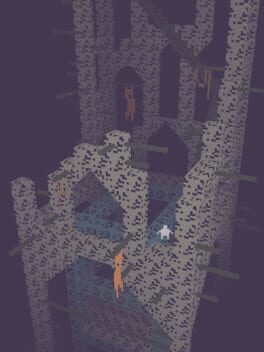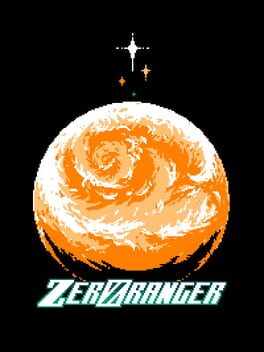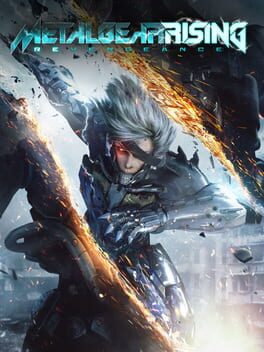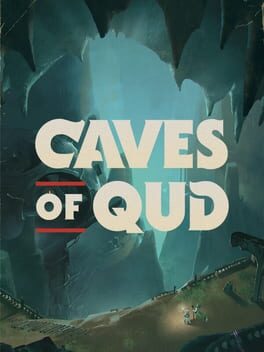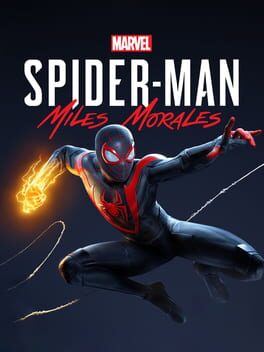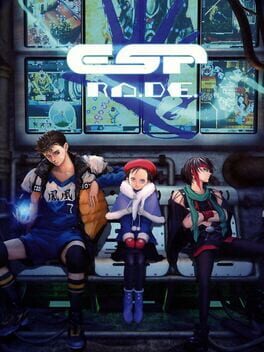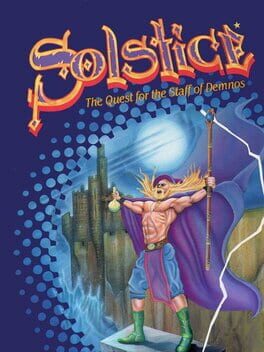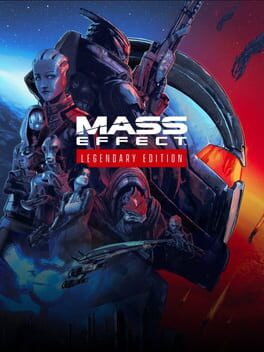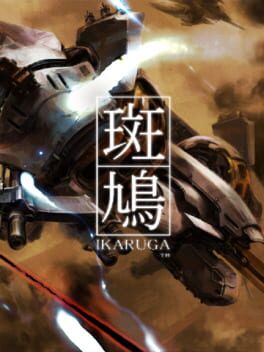InspectorJKB
51 Reviews liked by InspectorJKB
Hades
2018
The game where you dodge, attack, dodge, attack, dodge, attack, then remember you have one other move you can do, then dodge and attack again.
Do definitely play this if simple two button dodging and attacking gameplay is extremely exciting and stimulating to you. Oh and the music and artstyle is nice.
Do definitely play this if simple two button dodging and attacking gameplay is extremely exciting and stimulating to you. Oh and the music and artstyle is nice.
\\\//\\/\\\///
2020
i saw two people i follow mark that they want to play this and figured it was worth adding a review to mention (esp. b/c of the hard-to-google title) that about a year ago its developer took all their games off itch and it's no longer available there.
which is a bummer, this had a neat vibe, it was the first bitsy 3d game i played where i really felt that framework worked for it, and still probably my favorite thing made with it. if i learn that it's resurfaced i'll pass the word on.
EDIT: hideous cave goblin has temporarily made several of their games, including this one, public again
which is a bummer, this had a neat vibe, it was the first bitsy 3d game i played where i really felt that framework worked for it, and still probably my favorite thing made with it. if i learn that it's resurfaced i'll pass the word on.
EDIT: hideous cave goblin has temporarily made several of their games, including this one, public again
Kaze no Notam
1997
people will say "barely a game" while losing their mind over any aaa 3rd person thing where a mocapped voice actor makes crying faces and that's the whole thing. kaze no notam is sick. it's purity.... create a wrestler, how about create a balloon. GLIDE across an image of eden and all its vertices. Praise to the Holiest in the height!!!
ZeroRanger
2018
Considering the shmup genre has effortlessly sustained its status over the decades as the ultimate statement on the purity of videogame difficulty, it's no wonder that it has so adamantly rejected interference on its beautiful juxtaposition of being an all destroying one man army and the cruel fragility of getting annihilated by one measly small orange bullet. After all, why would you even consider perfecting something that was already perfectly conceived?
ZeroRanger's success rests not only on its reverance for the giants upon whose shoulders it stands on with rose-tinted glasses, in a similar fashion to Shovel Knight, but also in its ability to shorten the gap between newcomer and veteran of the monolithic genre, while sticking to its brutally familiar and established winning formula. Through the use of clever motivational incentives and an intriguing narrative, ZeroRanger manages to keep players from shutting off the game after getting a game over in less than 5 minutes, and with a simple set of satisfying mechanics that allow for the opportunity to strategically express yourself, the feeling of improvement and progress is an ever compelling sentiment that will surely lead you to its demanding yet soul cleansing finale.
The gorgeous two colored aesthetic and vibrant genre fused soundtrack are not just external flourishes of the gameplay that give it its striking and unique presentation, but are instead core components of it that dictate the flow, tone and pace of the action, allowing for some of the greatest interactive setpieces of escalating tension and catharsis I have had the pleasure of experiencing on this planet. ZeroRanger consistently display an astounding level of craft and showmanship on par and beyond the library of greatest shmups, that it isn't until you reach the modest list of credits filled with endearing homages when you are reminded that this was a passion project conceived by just two very talented Finland dudes commited to one-up the their heroes.
Ultimately, the greatest achievement of ZeroRanger is its enthusiasm in kick opening the doors to a genre that many would think would be closed off to them. Difficulty is an art. And like all great art, there needs to be an engaging communication between both parties. And I think ZeroRanger accomplished it flawlessly.
Also, the fucking drill. It has that too.
ZeroRanger's success rests not only on its reverance for the giants upon whose shoulders it stands on with rose-tinted glasses, in a similar fashion to Shovel Knight, but also in its ability to shorten the gap between newcomer and veteran of the monolithic genre, while sticking to its brutally familiar and established winning formula. Through the use of clever motivational incentives and an intriguing narrative, ZeroRanger manages to keep players from shutting off the game after getting a game over in less than 5 minutes, and with a simple set of satisfying mechanics that allow for the opportunity to strategically express yourself, the feeling of improvement and progress is an ever compelling sentiment that will surely lead you to its demanding yet soul cleansing finale.
The gorgeous two colored aesthetic and vibrant genre fused soundtrack are not just external flourishes of the gameplay that give it its striking and unique presentation, but are instead core components of it that dictate the flow, tone and pace of the action, allowing for some of the greatest interactive setpieces of escalating tension and catharsis I have had the pleasure of experiencing on this planet. ZeroRanger consistently display an astounding level of craft and showmanship on par and beyond the library of greatest shmups, that it isn't until you reach the modest list of credits filled with endearing homages when you are reminded that this was a passion project conceived by just two very talented Finland dudes commited to one-up the their heroes.
Ultimately, the greatest achievement of ZeroRanger is its enthusiasm in kick opening the doors to a genre that many would think would be closed off to them. Difficulty is an art. And like all great art, there needs to be an engaging communication between both parties. And I think ZeroRanger accomplished it flawlessly.
Also, the fucking drill. It has that too.
Caves of Qud
2015
It's not finished, and I'm not even finished with it, but I genuinely don't think any other game has gotten me this excited at the sheer scale of my options when creating a character. On various runs I've played a teleporting gunslinger, an inventor who could channel electricity into his weapons, and a swordswoman who could phase in and out of reality at the cost of being hunted by a parallel version of herself. The frustration of each death (on classic mode, at least) is tempered by the fact that now you have another opportunity to explore whatever mutations, implants, skills and systems you haven't touched or paired together yet. It is a game that challenges you to take the character-building options it's given you and create new, stupid sci-fi OCs, all of whom get to exist in a wonderfully creative and colorful take on a post-apocalypse. It's obtuse and there are some very real balance issues, but I'm incredibly excited to venture deeper into its world and see how it all comes together.
Addendum: After playing this for 130 hours and having died over, and over, and over again, having seen much of the game even if some stones still are unturned, I think I really just have to give it to Freehold Games for deciding to create a longform open-world RPG that's engrossing and interesting instead of one that's like, reasonable. This is a game where your level 30 character will die in the last dungeon because a psychic cloned himself and each of his clones used Sunder Mind on you at the same time, and you know what? Cool. Awesome. I unironically love this shit give me more please
Addendum: After playing this for 130 hours and having died over, and over, and over again, having seen much of the game even if some stones still are unturned, I think I really just have to give it to Freehold Games for deciding to create a longform open-world RPG that's engrossing and interesting instead of one that's like, reasonable. This is a game where your level 30 character will die in the last dungeon because a psychic cloned himself and each of his clones used Sunder Mind on you at the same time, and you know what? Cool. Awesome. I unironically love this shit give me more please
what does it mean to "feel like Spider-Man"? after all, that's the refrain we heard time and time again upon the release of Spider-Man for the PS4, and it's the question that I couldn't get out of my head every time I thought about this game.
looking at the mechanics of the game doesn't really answer that question for me, mostly because a shocking amount of the experience of this game is simply lifted wholesale from the Batman Arkham games with precious little alteration. the combat, the surprisingly present stealth sections that involve isolating a group of enemies with a chronic neck injury that prevents them from looking even slightly Up, "detective" segments that entirely involve looking for a yellow line to follow, even an omnipresent voice in your ear feeding you constant info, it's all as it was all the way back in 2009's Arkham Asylum, mostly unaltered. indeed, these games themselves were lauded at the time for "making you feel like Batman" but not nearly to the same hyperbolic memetic extent as marvel's sony's kevin feige's ike perlmutter's spider-man does for the ultimate arachnid-boy. generally speaking I would not consider Spider-Man and Batman to be characters that share an enormous deal in common outside of the very basic concept of fighting criminals in an urban environment, and in many ways there is an argument to be made that spider-man is batman's antithesis. and yet, somehow, essentially the same mechanics that created an experience that made you Feel Like Batman has made a great many people Feel Like Spider-Man.
the one meaningful mechanic which differentiates this from Arkham (though, maybe not as much as it perhaps should given the zip-to-point mechanic is again lifted completely wholesale from Arkham City) is the web-swinging, and it's a useful point in elucidating what the mechanical experience of this game does. web-swinging in this game is pleasing, stunningly well-animated, highly responsive, and also completely effortless. it's a struggle to even call it a mechanic: it is almost completely on auto-pilot, with nothing more involved than successive presses of R2 seeing Miles swing, leap, run on walls, the navigational experience of Spider-Man swinging through a painfully detailed recreation of Manhattan reduced to a single button. much like Assassin's Creed's automated free-running that clearly inspired the rhythms of play here, web swinging in this game looks fantastic - especially on a twitter clip captured with the patented SonyTM PlayStationTM ShareTM ButtonTM - but mechanically vacuous to the point of non-existence.
comparisons to Spider-Man 2's (the 2004 game, not this, the second instalment of the Marvel's Spider-Man franchise, nor the upcoming Marvel's Spider-Man 2, the third game in the Marvel's Spider-Man franchise) much lauded web swinging are passé, I know, but indulge me for just a moment: web-swinging in that game was beloved because it was a system. It had depth, it had a skill ceiling, it had moves that were difficult to pull off and a learning curve that required familiarity with the mechanic. it was enough to make a game in and of itself, and indeed it largely did because the rest of Spider-Man 2 ranges from unremarkable to poor. i don't know if i would go as far to say that this system "made me feel like spider-man" but it was, at the very least, a systemisation of this aspect of the character in such a way that it made for a compelling gameplay experience.
spider-man PS4 has none of this. it's mechanics are intentionally stripped down to the point that essentially the entire game is about pressing buttons at the right time in response to on-screen stimuli, and I know all video games can be boiled down to that, but Marvel's Spider-Man comes pre-boiled: the illusion it creates is so wafer thin that even a minute of thought reveals the 4K smoke and mirrors for what they really are. contrary to the appeals to the fraught concept of immersion the phrase "makes you feel like spider-man" evokes, I've scarcely felt more painfully aware that I am a person sitting on a sofa, holding a controller, than when playing this. when your entire game is frictionless, there's nothing to hang onto, either.
there is one sense in which the gameplay experience of Marvel's Miles Morales succeeds in capturing the spirit of the character, and that's in how his new powers frequently dissolve tension in the gameplay, with his invisibility offering you a fast charging get-out-of-jail-free card if you mess up the stealth (if being the operative word here) and the way almost every fight will end with an overpowered Venom Blast.
indeed, Marvel's Spider-Man: Miles Morales often does feel like a Spider-Man comic, but rarely in ways I enjoy. After tremendous backlash from vocal fans at the time to "The Night Gwen Stacy Died" issue of Spider-Man, Stan Lee (who at this point was increasingly disconnected from the actual goings-on of the universe he helped create to the point that he only knew Gwen was dead when someone at a con asked if she would come back to life) decreed that Marvel Comics should avoid meaningful change, change that might alienate longtime fans or, more importantly, those who wished to turn marvel characters into lunchboxes and action figures and cartoons and movies, and instead only offer the illusion of change. while the obvious response to this is that Peter Parker could only be replaced by his clone, Ben Reily, for a short period of time before the gravity of the status quo would pull Peter Parker back into the starring role, it also had something of a side-effect, which is that as a universe where meaningful change is resisted and avoided, Marvel Comics as a whole has a reactionary and conservative worldview that gravitates towards it's baked-in assumptions and the presumed goodness of those assumptions.
in 2004's Civil War, Marvel Comics sided with the PATRIOT act. In 2008's Secret Invasion, Marvel Comics used evil religious extremist shapeshifting Skrulls who hide among us and could be friends, co-workers, countrymen plotting the destruction of earth as an analogy for islamic terrorism. In 2012's Avengers VS X-Men, five heroes empowered by a cosmic force change the world for the better, curing diseases, ending world hunger, only to have those changes be rejected as unnatural, and eventually are consumed by said cosmic power. In 2019's House of X/Powers of X, the X-Men founded a nationalistic ethnostate for mutants that is an explicit parallel for the apartheid state of Israel and sees this as a good thing.
Whatever form it may take, whatever illusions of change may, however briefly, be affected, Marvel Comics are bound to a reflection of our status quo that is essentially desirable, and a huge amount of Superhero comics are about reinforcing their own status quos as well as our own, with high-profile stories such as DC's Doomsday Clock ultimately being nothing more than desperate appeals to the supposed self-evident relevance and importance of the unchanging status of these characters. All of this does not even mention the aggressive copaganda of the Marvel Cinematic Universe films, to the point where Captain Marvel was reproduced unaltered as propaganda for the US Air Force. Mainstream superheroes are always enforcers of the status quo, for good or for ill, but it's when the enforcement of that status quo comes up against depictions and discussions of the injustices of the real world that this becomes most uncomfortable.
There's a bit in this game, once you finish a side quest, where the camera pans up to a Black Lives Matter mural painted on the side of a building, and lingers there for just long enough to feel awkward. I don't object to the presence of this mural at all, but the direction decision here smacks as performative. It's not enough that the building is placed very prominently to ensure you can't miss it, but the game cranes itself to show you the image again, and the feeling of this can only really be described as the cinematography equivalent of "You know, I would have voted for Obama a third time if I could." It's desperate to demonstrate that it knows, it supports Black Lives Matter, but the functional reality of the rest of the game is aggressively at odds with what that movement is materially about.
I knew that the original 2018 Marvel's Spider-Man was in love with The Police but I can't describe how unprepared I still was for how aggressively conservative this game is. The story revolves around Miles Morales, while Peter Parker is on holiday to Generic Eastern Europeaistan, fighting against The Tinkerer and their evil plot to...destroy a product of an Evil Corporation that is giving people cancer. While at the eleventh hour they do contrive a reason why The Tinkerer's plan is #GoingTooFar, for most of the game there's actually no material reason for her to be in the wrong, and Miles Morales - and by extension, the game - is completely incapable of coming up with a single argument against her plan, simply resorting to "it's wrong! blowing things up is against the law!" or the classic "it's too risky! if even one person gets hurt that is too much!" said while Miles gives a Goon a severe concussion.
When I think of what Spider-Man means to me, what it is About, I think I'd describe it as the struggle to live up to an ideal of being our best selves, of always doing the right thing, in a world that makes that incredibly difficult to actually achieve, with our own personal failings and our endless conflicting responsibilities. In that sense, the Tinkerer, instrumentalized into meaningful action against an evil corporation by the death of a loved one, and struggling with how that affects her personal life and the relationships she has, is far more of a Spider-Man than Miles Morales in this game could ever be, given that his job is one of endless praise and assumed goodness facilitated by a hilarious uncritical depiction of the gig economy that sees the responsibility of Spider-Man morphed into a Deliveroo hustle grindset that always makes sure to respect Our Boys In Blue. How can something that loves the Police and hates direct action this much possibly claim to believe that Black Lives Matter?
In attempting to provide an "All-New, All-Different" up-to-date Spider-Man without making any effort to change the underlying assumptions it has about the world in which it lives, all this game does is expose how out of touch and outdated this whole concept is when the illusion of change fades away. Everything about this game is completely surface-level, all a well-presented illusion of Being Spider-Man that breaks the instant you think about it in any way, and you find yourself sitting your sofa, with your expensive toy for privileged people, pressing buttons to make the copaganda continue to play out in front of you.
I finished Marvel's Spider-Man: Miles Morales. I had a perfectly ok time. I was rarely frustrated and occasionally found it charming and visually enthralling. I liked stuff with Miles' uncle. It also made me feel like everything about this style of game and this type of story had hit an evolutionary dead-end and had nowhere to go but running on the same treadmill, forever.
So, yes. It made me feel like Spider-ManTM.
looking at the mechanics of the game doesn't really answer that question for me, mostly because a shocking amount of the experience of this game is simply lifted wholesale from the Batman Arkham games with precious little alteration. the combat, the surprisingly present stealth sections that involve isolating a group of enemies with a chronic neck injury that prevents them from looking even slightly Up, "detective" segments that entirely involve looking for a yellow line to follow, even an omnipresent voice in your ear feeding you constant info, it's all as it was all the way back in 2009's Arkham Asylum, mostly unaltered. indeed, these games themselves were lauded at the time for "making you feel like Batman" but not nearly to the same hyperbolic memetic extent as marvel's sony's kevin feige's ike perlmutter's spider-man does for the ultimate arachnid-boy. generally speaking I would not consider Spider-Man and Batman to be characters that share an enormous deal in common outside of the very basic concept of fighting criminals in an urban environment, and in many ways there is an argument to be made that spider-man is batman's antithesis. and yet, somehow, essentially the same mechanics that created an experience that made you Feel Like Batman has made a great many people Feel Like Spider-Man.
the one meaningful mechanic which differentiates this from Arkham (though, maybe not as much as it perhaps should given the zip-to-point mechanic is again lifted completely wholesale from Arkham City) is the web-swinging, and it's a useful point in elucidating what the mechanical experience of this game does. web-swinging in this game is pleasing, stunningly well-animated, highly responsive, and also completely effortless. it's a struggle to even call it a mechanic: it is almost completely on auto-pilot, with nothing more involved than successive presses of R2 seeing Miles swing, leap, run on walls, the navigational experience of Spider-Man swinging through a painfully detailed recreation of Manhattan reduced to a single button. much like Assassin's Creed's automated free-running that clearly inspired the rhythms of play here, web swinging in this game looks fantastic - especially on a twitter clip captured with the patented SonyTM PlayStationTM ShareTM ButtonTM - but mechanically vacuous to the point of non-existence.
comparisons to Spider-Man 2's (the 2004 game, not this, the second instalment of the Marvel's Spider-Man franchise, nor the upcoming Marvel's Spider-Man 2, the third game in the Marvel's Spider-Man franchise) much lauded web swinging are passé, I know, but indulge me for just a moment: web-swinging in that game was beloved because it was a system. It had depth, it had a skill ceiling, it had moves that were difficult to pull off and a learning curve that required familiarity with the mechanic. it was enough to make a game in and of itself, and indeed it largely did because the rest of Spider-Man 2 ranges from unremarkable to poor. i don't know if i would go as far to say that this system "made me feel like spider-man" but it was, at the very least, a systemisation of this aspect of the character in such a way that it made for a compelling gameplay experience.
spider-man PS4 has none of this. it's mechanics are intentionally stripped down to the point that essentially the entire game is about pressing buttons at the right time in response to on-screen stimuli, and I know all video games can be boiled down to that, but Marvel's Spider-Man comes pre-boiled: the illusion it creates is so wafer thin that even a minute of thought reveals the 4K smoke and mirrors for what they really are. contrary to the appeals to the fraught concept of immersion the phrase "makes you feel like spider-man" evokes, I've scarcely felt more painfully aware that I am a person sitting on a sofa, holding a controller, than when playing this. when your entire game is frictionless, there's nothing to hang onto, either.
there is one sense in which the gameplay experience of Marvel's Miles Morales succeeds in capturing the spirit of the character, and that's in how his new powers frequently dissolve tension in the gameplay, with his invisibility offering you a fast charging get-out-of-jail-free card if you mess up the stealth (if being the operative word here) and the way almost every fight will end with an overpowered Venom Blast.
indeed, Marvel's Spider-Man: Miles Morales often does feel like a Spider-Man comic, but rarely in ways I enjoy. After tremendous backlash from vocal fans at the time to "The Night Gwen Stacy Died" issue of Spider-Man, Stan Lee (who at this point was increasingly disconnected from the actual goings-on of the universe he helped create to the point that he only knew Gwen was dead when someone at a con asked if she would come back to life) decreed that Marvel Comics should avoid meaningful change, change that might alienate longtime fans or, more importantly, those who wished to turn marvel characters into lunchboxes and action figures and cartoons and movies, and instead only offer the illusion of change. while the obvious response to this is that Peter Parker could only be replaced by his clone, Ben Reily, for a short period of time before the gravity of the status quo would pull Peter Parker back into the starring role, it also had something of a side-effect, which is that as a universe where meaningful change is resisted and avoided, Marvel Comics as a whole has a reactionary and conservative worldview that gravitates towards it's baked-in assumptions and the presumed goodness of those assumptions.
in 2004's Civil War, Marvel Comics sided with the PATRIOT act. In 2008's Secret Invasion, Marvel Comics used evil religious extremist shapeshifting Skrulls who hide among us and could be friends, co-workers, countrymen plotting the destruction of earth as an analogy for islamic terrorism. In 2012's Avengers VS X-Men, five heroes empowered by a cosmic force change the world for the better, curing diseases, ending world hunger, only to have those changes be rejected as unnatural, and eventually are consumed by said cosmic power. In 2019's House of X/Powers of X, the X-Men founded a nationalistic ethnostate for mutants that is an explicit parallel for the apartheid state of Israel and sees this as a good thing.
Whatever form it may take, whatever illusions of change may, however briefly, be affected, Marvel Comics are bound to a reflection of our status quo that is essentially desirable, and a huge amount of Superhero comics are about reinforcing their own status quos as well as our own, with high-profile stories such as DC's Doomsday Clock ultimately being nothing more than desperate appeals to the supposed self-evident relevance and importance of the unchanging status of these characters. All of this does not even mention the aggressive copaganda of the Marvel Cinematic Universe films, to the point where Captain Marvel was reproduced unaltered as propaganda for the US Air Force. Mainstream superheroes are always enforcers of the status quo, for good or for ill, but it's when the enforcement of that status quo comes up against depictions and discussions of the injustices of the real world that this becomes most uncomfortable.
There's a bit in this game, once you finish a side quest, where the camera pans up to a Black Lives Matter mural painted on the side of a building, and lingers there for just long enough to feel awkward. I don't object to the presence of this mural at all, but the direction decision here smacks as performative. It's not enough that the building is placed very prominently to ensure you can't miss it, but the game cranes itself to show you the image again, and the feeling of this can only really be described as the cinematography equivalent of "You know, I would have voted for Obama a third time if I could." It's desperate to demonstrate that it knows, it supports Black Lives Matter, but the functional reality of the rest of the game is aggressively at odds with what that movement is materially about.
I knew that the original 2018 Marvel's Spider-Man was in love with The Police but I can't describe how unprepared I still was for how aggressively conservative this game is. The story revolves around Miles Morales, while Peter Parker is on holiday to Generic Eastern Europeaistan, fighting against The Tinkerer and their evil plot to...destroy a product of an Evil Corporation that is giving people cancer. While at the eleventh hour they do contrive a reason why The Tinkerer's plan is #GoingTooFar, for most of the game there's actually no material reason for her to be in the wrong, and Miles Morales - and by extension, the game - is completely incapable of coming up with a single argument against her plan, simply resorting to "it's wrong! blowing things up is against the law!" or the classic "it's too risky! if even one person gets hurt that is too much!" said while Miles gives a Goon a severe concussion.
When I think of what Spider-Man means to me, what it is About, I think I'd describe it as the struggle to live up to an ideal of being our best selves, of always doing the right thing, in a world that makes that incredibly difficult to actually achieve, with our own personal failings and our endless conflicting responsibilities. In that sense, the Tinkerer, instrumentalized into meaningful action against an evil corporation by the death of a loved one, and struggling with how that affects her personal life and the relationships she has, is far more of a Spider-Man than Miles Morales in this game could ever be, given that his job is one of endless praise and assumed goodness facilitated by a hilarious uncritical depiction of the gig economy that sees the responsibility of Spider-Man morphed into a Deliveroo hustle grindset that always makes sure to respect Our Boys In Blue. How can something that loves the Police and hates direct action this much possibly claim to believe that Black Lives Matter?
In attempting to provide an "All-New, All-Different" up-to-date Spider-Man without making any effort to change the underlying assumptions it has about the world in which it lives, all this game does is expose how out of touch and outdated this whole concept is when the illusion of change fades away. Everything about this game is completely surface-level, all a well-presented illusion of Being Spider-Man that breaks the instant you think about it in any way, and you find yourself sitting your sofa, with your expensive toy for privileged people, pressing buttons to make the copaganda continue to play out in front of you.
I finished Marvel's Spider-Man: Miles Morales. I had a perfectly ok time. I was rarely frustrated and occasionally found it charming and visually enthralling. I liked stuff with Miles' uncle. It also made me feel like everything about this style of game and this type of story had hit an evolutionary dead-end and had nowhere to go but running on the same treadmill, forever.
So, yes. It made me feel like Spider-ManTM.
ESP Ra.De.
1998
Chrono Trigger
1995
A lot is said about how Chrono Trigger looks great and has a bitchin' soundtrack. And yeah, it does, but a lot of games have those things, and the gameplay isn't all that deep. But I've come back to this game what must be about twenty times at this point. I think it has a lot more to do with the story.
Chrono Trigger is a story about discovering that the world is more complex than it appears. Masato Kato seems to have a love for such stories, judging by his later work on Xenogears. I also love this sort of narrative. It evokes the same feeling as, say, learning that the world isn't as fair as you thought. Maybe problems don't have solutions as simple as fiction likes to present them. Maybe the systems that govern our lives are too complicated and insidious for that.
Xenogears has many layers of obfuscation and discovery about the world. It has so many that at some point it becomes convoluted to the point of comedy. I do like Xenogears a lot, but Chrono Trigger is a much brisker and tighter experience that still has an impact.
I haven't seen much actual plot analysis for Chrono Trigger, so I'm going to try and break down my thoughts on it.
The initiating incident is that Crono meets a princess at a festival. After some time shenanigans and a kidnapping plot, he has to save her. Rescuing a princess is about the most archetypical video game plot there is, and it sets up a simple premise. There are no other known conflicts at this point. Saving the princess will solve everything, like in Mario, Zelda, etc.
It doesn't quite work out that way. Right afterward, Crono is put on trial for kidnapping the princess. Bringing the princess back only created a new, more complicated conflict. The world is not as simple as saving a princess and getting rewarded. The player is judged for it, and even for the most innocent actions committed at the start of the game. Video games have a tendency to present important decisions in an obvious way. Here, though, it even matters if you picked up the princess's pendant before trying to talk to her.
The trial scene is when the game seems to grab most people. It comes out of left field, and it's neat how well the game hid the decisions that influence it during the festival. At this point the main story of Chrono Trigger, about trying to stop the apocalypse, hasn't started. But this entire stretch leading into the first visit to 2300 AD is a microcosm of the story's structure.
Next, we have the visit to the post-apocalypse of 2300 AD. The protagonists learn that a massive monster called Lavos will destroy the world in 1999 AD. They vow to prevent that. When they get back to 1000 AD, they hear that Magus created Lavos in 600 AD.
Now we're onto the main story. This time, the archetypical plot we're starting from is in the framework of Dragon Quest. It's a huge escalation in scale compared to the princess story, but it looks like there's a straightforward path. If the Hero (Frog) gets the MacGuffin (Masamune) and defeats the Bad Guy (Magus, named Maou in Japanese, the title that many Dragon Quest villains hold), then the day will be saved.
And again, this turns out to be much more complicated. Lavos has actually existed since long, long before Magus. As we learn more about the shared history between Lavos and humanity, we learn that this is a problem with no obvious solution. The rise of human civilization coincided with the arrival of Lavos. Humans built a great empire with the energy that Lavos provided, but Lavos also destroyed that empire. There's technology in 2300 AD that the pendant reacts to too, so unless the Guru of Reason built it all, Lavos's energy was presumably harvested at some point after 1000 AD. And again it destroyed civilization.
There's a lot that someone could read into Lavos and what it represents. The game never goes out of its way to explain what it is or where it came from. But on a basic level, Lavos is a great and enticing, but dangerous, energy source. Not just dangerous, but really, really obviously dangerous. And yet people continued to use it until they destroyed themselves. Twice, assuming that this is what happened in 1999.
No longer is this a story about good and evil and beating a villain with a magic sword. Magus wasn't evil, and even Lavos isn't. It's just a creature trying to survive and reproduce. The people of Zeal just wanted their magic floating cities. And what you're left with is a giant, mindless creature that, even now, seems unstoppable. You've been free to fight Lavos since a couple hours into the game, but you can't win. (Or, well, you can with a lot of grinding. But let's say players are being reasonable.)
There are a lot of stories about impending disaster or climate change allegories or the like. But I love that Chrono Trigger presents its impending disaster as having one simple, straightforward solution before telling the player that, actually, it doesn't work that way. The first time you're forced to actually go up against Lavos, the player's self-insert dies, and Zeal meets the same fate that it would have if you never came at all.
After this whole arc of the story concludes, the story becomes open-ended. You could go straight to the final dungeon and not even revive Crono, if you wanted. You can revive Crono, fix every problem in every era, collect all the best stuff, then do the final dungeon and fight Lavos. You can fight Lavos without going through the final dungeon too, like you've always been able to. At the start of this segment, you're still probably not able to kill Lavos, but it's up to you to come up with a solution. In the end, it's not that hard to kill Lavos. The solution comes down to getting strong enough that you don't immediately die when it hits you. But you have to decide how to do that.
Anyway, there's plenty of little character moments throughout the game that I like too. The scene where Lucca relives when her mother loses her legs always gives me chills. It says everything you need to know about what motivates her in a couple of minutes.
But the overarching story isn't about the characters as individuals. Crono has no personality because he's you, the player, learning about the world. The time travel is a mechanism for slowly unraveling the world's history and the truth about Lavos. It's all in service of creating a sense of discovery in a world that once seemed simple. It's limited as a Super Nintendo game and Xenogears gets way, way more complicated, but at least this game was finished, and I can get to the end in fifteen hours.
Chrono Trigger is a story about discovering that the world is more complex than it appears. Masato Kato seems to have a love for such stories, judging by his later work on Xenogears. I also love this sort of narrative. It evokes the same feeling as, say, learning that the world isn't as fair as you thought. Maybe problems don't have solutions as simple as fiction likes to present them. Maybe the systems that govern our lives are too complicated and insidious for that.
Xenogears has many layers of obfuscation and discovery about the world. It has so many that at some point it becomes convoluted to the point of comedy. I do like Xenogears a lot, but Chrono Trigger is a much brisker and tighter experience that still has an impact.
I haven't seen much actual plot analysis for Chrono Trigger, so I'm going to try and break down my thoughts on it.
The initiating incident is that Crono meets a princess at a festival. After some time shenanigans and a kidnapping plot, he has to save her. Rescuing a princess is about the most archetypical video game plot there is, and it sets up a simple premise. There are no other known conflicts at this point. Saving the princess will solve everything, like in Mario, Zelda, etc.
It doesn't quite work out that way. Right afterward, Crono is put on trial for kidnapping the princess. Bringing the princess back only created a new, more complicated conflict. The world is not as simple as saving a princess and getting rewarded. The player is judged for it, and even for the most innocent actions committed at the start of the game. Video games have a tendency to present important decisions in an obvious way. Here, though, it even matters if you picked up the princess's pendant before trying to talk to her.
The trial scene is when the game seems to grab most people. It comes out of left field, and it's neat how well the game hid the decisions that influence it during the festival. At this point the main story of Chrono Trigger, about trying to stop the apocalypse, hasn't started. But this entire stretch leading into the first visit to 2300 AD is a microcosm of the story's structure.
Next, we have the visit to the post-apocalypse of 2300 AD. The protagonists learn that a massive monster called Lavos will destroy the world in 1999 AD. They vow to prevent that. When they get back to 1000 AD, they hear that Magus created Lavos in 600 AD.
Now we're onto the main story. This time, the archetypical plot we're starting from is in the framework of Dragon Quest. It's a huge escalation in scale compared to the princess story, but it looks like there's a straightforward path. If the Hero (Frog) gets the MacGuffin (Masamune) and defeats the Bad Guy (Magus, named Maou in Japanese, the title that many Dragon Quest villains hold), then the day will be saved.
And again, this turns out to be much more complicated. Lavos has actually existed since long, long before Magus. As we learn more about the shared history between Lavos and humanity, we learn that this is a problem with no obvious solution. The rise of human civilization coincided with the arrival of Lavos. Humans built a great empire with the energy that Lavos provided, but Lavos also destroyed that empire. There's technology in 2300 AD that the pendant reacts to too, so unless the Guru of Reason built it all, Lavos's energy was presumably harvested at some point after 1000 AD. And again it destroyed civilization.
There's a lot that someone could read into Lavos and what it represents. The game never goes out of its way to explain what it is or where it came from. But on a basic level, Lavos is a great and enticing, but dangerous, energy source. Not just dangerous, but really, really obviously dangerous. And yet people continued to use it until they destroyed themselves. Twice, assuming that this is what happened in 1999.
No longer is this a story about good and evil and beating a villain with a magic sword. Magus wasn't evil, and even Lavos isn't. It's just a creature trying to survive and reproduce. The people of Zeal just wanted their magic floating cities. And what you're left with is a giant, mindless creature that, even now, seems unstoppable. You've been free to fight Lavos since a couple hours into the game, but you can't win. (Or, well, you can with a lot of grinding. But let's say players are being reasonable.)
There are a lot of stories about impending disaster or climate change allegories or the like. But I love that Chrono Trigger presents its impending disaster as having one simple, straightforward solution before telling the player that, actually, it doesn't work that way. The first time you're forced to actually go up against Lavos, the player's self-insert dies, and Zeal meets the same fate that it would have if you never came at all.
After this whole arc of the story concludes, the story becomes open-ended. You could go straight to the final dungeon and not even revive Crono, if you wanted. You can revive Crono, fix every problem in every era, collect all the best stuff, then do the final dungeon and fight Lavos. You can fight Lavos without going through the final dungeon too, like you've always been able to. At the start of this segment, you're still probably not able to kill Lavos, but it's up to you to come up with a solution. In the end, it's not that hard to kill Lavos. The solution comes down to getting strong enough that you don't immediately die when it hits you. But you have to decide how to do that.
Anyway, there's plenty of little character moments throughout the game that I like too. The scene where Lucca relives when her mother loses her legs always gives me chills. It says everything you need to know about what motivates her in a couple of minutes.
But the overarching story isn't about the characters as individuals. Crono has no personality because he's you, the player, learning about the world. The time travel is a mechanism for slowly unraveling the world's history and the truth about Lavos. It's all in service of creating a sense of discovery in a world that once seemed simple. It's limited as a Super Nintendo game and Xenogears gets way, way more complicated, but at least this game was finished, and I can get to the end in fifteen hours.

